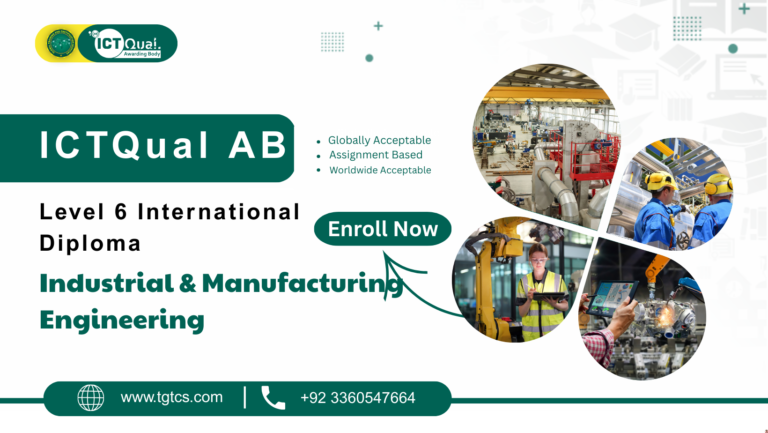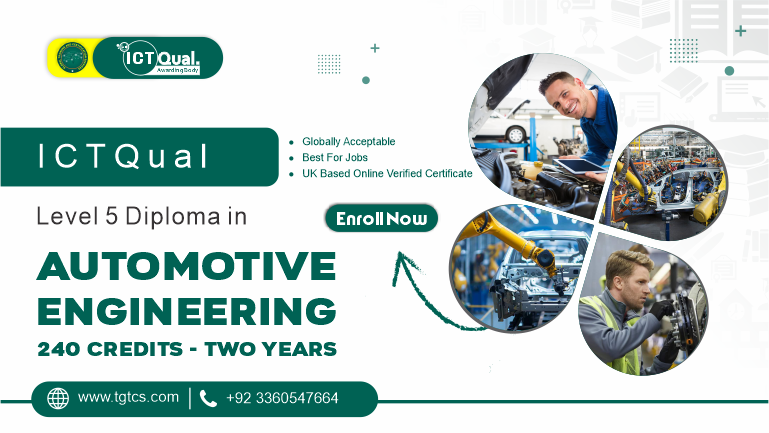ICTQual AB Level 6 Diploma in Industrial Instrument Technician
The ICTQual AB Level 6 Diploma in Industrial Instrument Technician is an advanced vocational qualification designed for professionals seeking to deepen their expertise in industrial instrumentation and control systems. This diploma builds upon foundational knowledge and introduces learners to complex instrumentation technologies, system integration, and advanced diagnostics used in high-performance industrial environments. It is tailored for individuals aiming to take on senior technical roles or transition into supervisory and engineering-focused positions.
Throughout the course, learners engage with sophisticated instrumentation systems, including programmable logic controllers (PLCs), distributed control systems (DCS), and supervisory control and data acquisition (SCADA) platforms. The curriculum emphasizes advanced calibration techniques, system design, fault analysis, and compliance with international standards. Learners also develop skills in technical documentation, project coordination, and safety management, ensuring they are equipped to lead instrumentation activities in sectors such as oil and gas, power generation, manufacturing, and process industries.
By completing the ICTQual AB Level 6 Diploma, graduates gain a globally recognized qualification that enhances their professional credibility and opens pathways to higher education and specialized certifications. The program not only strengthens technical proficiency but also fosters leadership, problem-solving, and decision-making abilities essential for complex industrial operations. This diploma is ideal for experienced technicians, engineering associates, and professionals committed to advancing their careers in instrumentation and automation.
The Global Training and Certification Services is Approved Training Centre of ICTQual AB UK Ltd
Course Level and Credits
The ICTQual AB Level 6 Diploma in Industrial Instrument Technician is an advanced vocational qualification aligned with international standards. It represents a higher-level credential designed for experienced professionals and carries credits that support academic progression and global recognition.
Mode of Study
The course is delivered through a blended learning approach, combining advanced theoretical instruction, hands-on practical training, and self-paced study modules. This format allows learners to engage deeply with complex instrumentation systems while accommodating professional commitments.
Global Recognition & Attestation
This diploma is internationally recognized and can be attested by relevant authorities for employment and academic use across borders. It meets the requirements for equivalency in multiple regions, making it a valuable credential for professionals seeking global mobility.
Scope and Purpose
The course is designed to prepare learners for senior technician and supervisory roles in industrial instrumentation and control. It focuses on advanced system integration, diagnostics, compliance, and leadership in sectors such as oil & gas, power generation, manufacturing, and process industries.
Skills and Knowledge Gained
Learners develop expertise in working with PLCs, DCS, and SCADA systems, advanced calibration techniques, fault analysis, and technical documentation. They also gain skills in safety management, project coordination, and regulatory compliance, enabling them to lead instrumentation activities confidently.
Career Benefits
Graduates of this diploma are equipped for advanced roles such as Senior Instrument Technician, Instrumentation Supervisor, or Automation Specialist. The qualification enhances professional credibility, supports career advancement, and opens pathways to higher education and specialized certifications.
Mandatory Unit
This qualification, the ICTQual AB Level 6 Diploma in Industrial Instrument Technician, consists of 6 mandatory units.
- Advanced Principles of Industrial Instrumentation
- Process Dynamics and Complex Variable Control
- Advanced Instrument Calibration and Quality Assurance
- Industrial Sensors, Transducers, and Final Control Elements
- Distributed Control Systems (DCS), PLCs, and Advanced Automation
- Reliability, Maintenance Strategies, and Industrial Safety Management
Learning Outcomes for the ICTQual AB Level 6 Diploma in Industrial Instrument Technician:
Advanced Principles of Industrial Instrumentation
- Critically evaluate advanced theories and principles of industrial instrumentation.
- Analyse the role of instrumentation in optimising complex industrial processes.
- Apply advanced measurement concepts including accuracy, precision, and uncertainty analysis.
- Assess the impact of instrumentation design on system performance and reliability.
- Integrate knowledge of electronics, control theory, and instrumentation for advanced applications.
- Demonstrate the ability to design and configure instrumentation systems for specialised industries.
- Evaluate international standards and compliance requirements in advanced instrumentation.
- Develop problem‑solving skills for complex instrumentation challenges.
Process Dynamics and Complex Variable Control
- Explain the dynamic behaviour of industrial processes and their impact on control strategies.
- Model and analyse multi‑variable process systems using advanced techniques.
- Apply control theory to manage interacting process variables effectively.
- Evaluate the performance of advanced control strategies such as cascade, feedforward, and ratio control.
- Implement optimisation techniques for stability, accuracy, and efficiency in process control.
- Assess the role of process dynamics in safety, quality, and productivity.
- Use simulation tools to predict and improve process behaviour under varying conditions.
- Develop advanced troubleshooting skills for dynamic process control systems.
Advanced Instrument Calibration and Quality Assurance
- Apply advanced calibration methods for complex industrial instruments.
- Evaluate calibration standards, traceability, and international compliance frameworks.
- Design and implement calibration schedules for large‑scale industrial operations.
- Analyse calibration data to ensure accuracy, reliability, and repeatability.
- Integrate quality assurance principles into calibration and testing procedures.
- Troubleshoot calibration issues and propose corrective actions.
- Document calibration processes in line with advanced industry standards.
- Develop strategies to minimise downtime and optimise calibration efficiency.
Industrial Sensors, Transducers, and Final Control Elements
- Critically analyse the design and operation of advanced industrial sensors and transducers.
- Select appropriate sensing technologies for complex industrial applications.
- Evaluate the performance characteristics of sensors under varying conditions.
- Assess the role of final control elements, including advanced control valves and actuators.
- Integrate sensors and final control elements into distributed and automated systems.
- Diagnose and resolve faults in advanced sensing and control devices.
- Apply knowledge of material properties and environmental factors in sensor selection.
- Develop innovative solutions for integrating smart sensors and IoT technologies.
Distributed Control Systems (DCS), PLCs, and Advanced Automation
- Explain the architecture and functions of modern DCS and PLC systems.
- Develop advanced PLC programming skills using structured programming languages.
- Integrate DCS and PLC systems with industrial networks and communication protocols.
- Apply automation strategies to optimise process efficiency and reliability.
- Evaluate cybersecurity considerations in industrial automation systems.
- Troubleshoot complex automation systems involving multiple controllers.
- Implement advanced human‑machine interface (HMI) and SCADA solutions.
- Assess the role of automation in Industry 4.0 and smart manufacturing environments.
Reliability, Maintenance Strategies, and Industrial Safety Management
- Evaluate advanced maintenance strategies including predictive and condition‑based maintenance.
- Apply reliability engineering principles to instrumentation and control systems.
- Develop systematic troubleshooting frameworks for complex industrial systems.
- Assess the role of safety management systems in high‑risk industrial environments.
- Implement international safety standards and regulatory compliance practices.
- Analyse risk factors and develop mitigation strategies for instrumentation systems.
- Integrate reliability and safety considerations into system design and operation.
- Promote a culture of continuous improvement, safety, and reliability in industrial practice.
The ICTQual AB Level 6 Diploma in Industrial Instrument Technician is designed to elevate learners into advanced roles within industrial instrumentation and control. It offers a rigorous curriculum that blends technical depth, leadership development, and global relevance, making it ideal for professionals aiming to lead instrumentation operations or progress into engineering-focused careers.
Advanced Technical Expertise
- Work with complex instrumentation systems including PLCs, DCS, and SCADA platforms
- Apply advanced calibration techniques across diverse industrial environments
- Perform high-level diagnostics and fault analysis for system optimization
- Interpret and develop detailed technical documentation and loop diagrams
- Integrate instrumentation with automation and control systems for enhanced performance
System Integration and Compliance
- Ensure instrumentation aligns with international standards and regulatory frameworks
- Coordinate instrumentation activities within multidisciplinary engineering projects
- Manage documentation for audits, inspections, and quality assurance
- Implement safety protocols and risk assessments in high-risk environments
- Support compliance with environmental, operational, and technical specifications
Leadership and Project Management
- Lead instrumentation teams in planning, execution, and maintenance tasks
- Develop project coordination skills for instrumentation-related initiatives
- Mentor junior technicians and support workforce development
- Communicate effectively with cross-functional teams and stakeholders
- Manage timelines, resources, and reporting within instrumentation projects
Career Advancement and Global Mobility
- Qualify for senior roles such as Instrumentation Supervisor or Automation Specialist
- Enhance professional credibility with a globally recognized Level 6 diploma
- Access opportunities in multinational companies and international projects
- Build a foundation for further study in engineering or specialized certifications
- Strengthen your resume for leadership roles in industrial instrumentation
Professional Growth and Confidence
- Develop strategic thinking and decision-making skills in technical contexts
- Gain confidence in managing complex systems and high-stakes operations
- Cultivate a proactive approach to problem-solving and innovation
- Build resilience and adaptability in dynamic industrial environments
- Take pride in mastering advanced instrumentation and contributing to industry excellence
Completing the ICTQual AB Level 6 Diploma empowers learners with the advanced skills, leadership capabilities, and global recognition needed to thrive in senior instrumentation roles and shape the future of industrial automation.
The ICTQual AB Level 6 Diploma in Industrial Instrument Technician is tailored for individuals who are ready to take their expertise in instrumentation and control systems to an advanced level. This course is ideal for professionals seeking leadership roles, deeper technical mastery, and global recognition in industrial environments.
Experienced Instrumentation Technicians
- Professionals with prior experience in instrumentation and control systems
- Individuals looking to upgrade from Level 3 or Level 4 qualifications
- Technicians aiming to handle complex systems such as DCS, SCADA, and PLCs
- Those seeking to lead maintenance and calibration teams
- Learners interested in advanced diagnostics and system optimization
Engineering Associates and Technical Supervisors
- Individuals working alongside engineers in industrial projects
- Supervisors managing instrumentation teams or operations
- Professionals responsible for compliance, documentation, and reporting
- Learners seeking to bridge the gap between technician and engineering roles
- Candidates preparing for roles in project coordination and system integration
Vocational Graduates Seeking Specialization
- Holders of diplomas in electrical, mechanical, or automation fields
- Learners aiming to specialize in instrumentation within industrial sectors
- Individuals seeking a globally recognized credential to enhance employability
- Candidates preparing for advanced studies or certifications in control systems
- Graduates looking to deepen their understanding of industrial automation
Career Changers with Technical Backgrounds
- Professionals from related fields such as electrical maintenance or automation
- Individuals transitioning into instrumentation roles from other technical domains
- Learners seeking a structured pathway into advanced industrial roles
- Candidates interested in high-demand sectors like oil & gas or manufacturing
- People looking for international opportunities in instrumentation and control
Professionals Seeking International Recognition
- Technicians and supervisors aiming for certification accepted worldwide
- Individuals preparing for roles in multinational companies or overseas projects
- Learners needing attested qualifications for compliance and career advancement
- Candidates seeking to validate their skills for international job markets
- Professionals looking to enhance their resumes with a Level 6 credential
The ICTQual AB Level 6 Diploma in Industrial Instrument Technician is ideal for learners who are serious about advancing their careers, mastering complex systems, and stepping into leadership roles in industrial instrumentation. It equips professionals with the skills, confidence, and credentials to thrive in demanding global environments.
Course Overview
Course Level
Level 3
Course Units
6 Units
Credits
60






